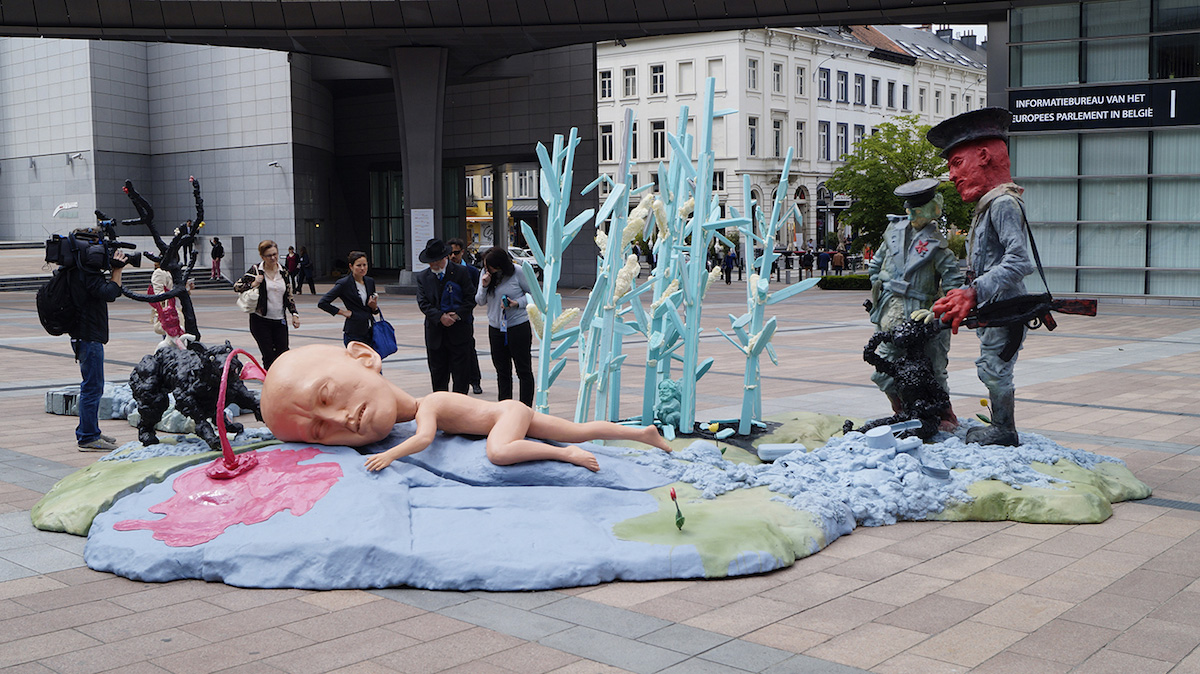News
Watch Again: European Historical Memory Conference - ''Past for the Future''
The ''Past for the Future'' Conference, organised by the Platform of European Memory Conscience, the Collège des Bernardins and the European Economic and Social Committee, took place on the 16th and 17th of November.
The main goal of the conference is to look for answers to important questions such as: What European narrative line(s) do we need in a united Europe? Is Europe ready for a judgment of the communist regimes?
Day I (YouTube link)
00:01: First Panel Introduction
01:30: First Panel
47:25: Q&A First Panel
1:05:25: Break
1:26:30: Second Panel Introduction
1:28:35: Second Panel
2:20:20: Q&A Second Panel
2:35:55: Conclusion
Day II (YouTube link)
00:01: Third Panel Introduction
02:30: Third Panel
01:06:35: Break
01:29:00: Fourth Panel Introduction
01:35:20: Fourth Panel
02:21:15: Q&A Fourth Panel
02:29:50: Conclusion
SHORT SUMMARY:
Day II / Panel III / Presentations on Communist Crimes
Topic: Is Europe ready for a judgment of the communist regimes?
Moderator: Pawel Ukielski, Deputy Director of the Warsaw Rising Museum
Speakers:
Neela Winkelmann-Heyrovská, former Managing Director of the Platform of European Memory and Conscience
Andreja Valič Zver, former Director of the Study Centre for National Reconciliation, current advisor in the Cabinet of the Prime Minister (Slovenia)
Françoise Thom, Senior Lecturer of History and Sovietology at the University of Paris-Sorbonne
***
Andreja Valič Zver: Europe is not ready for the judgement of communist regimes.
Some EU member states such as Poland, Germany, Hungary, and the Baltic states, have dealt well with the legacy of totalitarian crimes, and communist regime crimes in particular. The situation is worse, however, in many other countries and at the EU level.
Even though the European Parliament adopted both the Resolution of 2 April 2009 on European Conscience and Totalitarianism and the Resolution of 19 September 2019 on the Importance of European Remembrance for the Future of Europe, there is still a visible lack of political will to take any further steps to address this issue.
Valič Zver stated that EU states’ unwillingness to address crimes of totalitarian regimes “is particularly visible on the political left and in the western countries that had not suffered under the communist regimes”.
It would, nevertheless, be useful to form an international court to condemn the crimes of communism, in order to strengthen common European values and to prevent the recurrence of totalitarian rule in the future.
Françoise Thom: Europe seems to be less and less ready for a judgment of communism.
The memory of communism is receding, as people become less and less aware of its existence in the past. For today's younger generations, the communist period is perceived as a rather distant time and it is difficult for them to relate to it.
In addition, Thom argued that there is a worrisome expansion of relativism in Western thought. This is problematic because individuals are not able to understand the difference between the truth and falsehoods, which in effect makes it difficult to pronounce a judgement. She states that "To judge communism, to put communism on trial, you have to acknowledge the existence of good and evil".
Neela Winkelmann-Heyrovská: I believe we can achieve an international condemnation of communism.
After the fall of communism, the process of legal retribution and redress that was carried out at the end of World War II, when the International Military Tribunal at Nuremberg was established, did not take place for the victims who had been affected by the crimes of communist regimes.
At present, the perpetrators of crimes against humanity under communist regimes still live in our societies, and the victims of these crimes, and their families, face repeated trauma.
In 2014 the Platform of European Memory and Conscience launched the “JUSTICE 2.0” project. The project’s first public presentation took place on May 27, 2015 in the European Parliament in Brussels and was accompanied by an art installation by the Czech artist group, Pode Bal. The purpose of this project is to raise international awareness about the issue of unpunished international crimes of communism and to contribute to finding ways to achieve international justice for these crimes.
A brief chronology of the project
The Platform’s activities have encouraged political actors to take action. In March 2017 the district court in Bratislava decided to rehabilitate Hartmut Tautz, the 18-year-old refugee who was killed by border guard dogs on the Czechoslovak border with Austria in 1986.

Based on this breakthrough decision, in November of 2017, the Platform and the Union of Victims of Communist Tyranny called upon former East German refugees who were arrested in former Czechoslovakia to apply for court rehabilitation and compensation from the Czech and Slovak Republics. This project has been very successful (read more about it here).
Since 2017 forty-eight citizens of former East Germany who were killed or caught in Czechoslovakia trying to cross the Iron Curtain to the West have been rehabilitated by courts in the Czech and Slovak Republics. Thirty-eight of them have received financial compensation, with the remaining ten cases pending while court hearings are being planned for four further refugees.
Winkelman stated, “We hope that by drawing attention to these international crimes, we will be able to achieve the international condemnation of communism in an easier way”.
Watch it again on the platform's YouTube channel